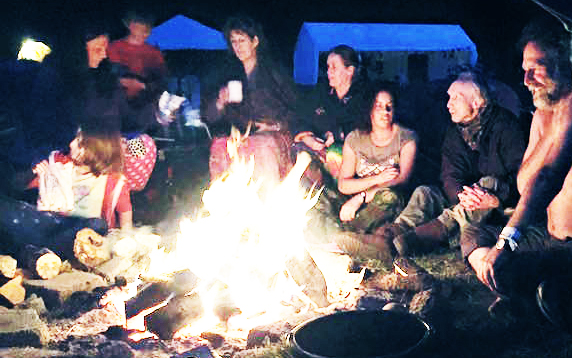Sure, you have a stove and an oven in your RV or trailer, but camping just isn’t the same without building a proper fire. You may or may not use this fire for cooking, but a campfire is the centerpiece for storytelling, drinking, and bonding in general. Besides, just because you’ve got an RV and are not tent camping doesn’t mean you won’t be making S’mores.
For part II of this series, visit: The Perfect Campfire Series (Part I): Choosing the Right Fire Wood for a Long-Lasting Campfire.
There are several ways to build a fire, but we’ve got some tips so you build a good fire: one that doesn’t start and putter out. Plus, you don’t want a fire that is full of smoke and spark. Is there really a right way to make a fire, you ask? Well, yes, and also the type of wood that you use is most important. You can’t just throw any old branch in the fire and expect to have nice, steadily burning flames that don’t choke you with smoke and sparks. You need the right firewood for a campfire.

Different types of wood burn differently, and some are perfect for campfires. Many people think that hardwoods are the only type of wood to use for a proper fire, but that’s not true. While they do burn better than softwood, there are a few of those cheaper and easier to find softwoods that are perfectly fine for the job too. Most importantly, you never want to use wood that is still damp. Freshly cut wood just won’t do. Generally cut wood should have been sitting out for a year or two. The older, the better.
As you search for fire wood, chances are you won’t be able to tell how dry the logs truly are, but you can at the very least avoid chopping fresh wood for your camping trip. Always buy seasoned wood and look for types of wood that burn the best and longest. Buy close to the campsite, but you may want to avoid buying it at the site, where it’s not only more expensive but the wood is also often not aged long enough. With that said, many campgrounds do not allow you to bring your own firewood, so call and ask before spending tons of money on wood you will not be able to burn.
Here is our roundup for wood that will keep your campfire going for hours.
- Oak is the most popular type of firewood. It’s a hardwood that burns slowly without much smoke. It also lasts longer than most other types of firewood.
- Maple is another hardwood favorite. It is a strong wood that burns slowly and for a long time. It’s also low on smoke. The tough part is chopping this durable wood.
- Cherry Wood is perfect for cooking if you’re looking to add a little smokiness to your meats. This wood is strong and burns for a long time. It is a little smokier than oak and maple but it’s a lot easier to chop than both.
- Ash is the most common type of wood you’ll find. It’s tough and it burns slowly. It’s easy to split and plentiful in most
 areas.
areas. - Fruit Tree Wood from orange, apple, lemon, and lime trees is wonderful because of the aroma. These woods have little spark and burn for quite a while.
- Pine is a softwood that burns nicely. It’s easy to split but it does burn quickly and is not ideal for producing heat. You’ll need lots of this wood for a long-burning fire.
- Fir is another softwood that gets relatively hot, or at least hotter than pine, and doesn’t produce much ash at all. It’s easy to split and sparks only moderately. This is one wood that you can’t be impatient with. Fir must be seasoned at least a year to dry and burn efficiently.
Next, you’ll need to pick the right spot, prepare a pit and build your campfire. You’ll find these topics in Part II of QRV’s Perfect Campfire Series. Stay tuned each week for this and other informative articles that’ll make your adventures as amazing as they can be.
Always make sure you have insurance. Keep your RV away from the campfire, but kitchen fires do happen quite often. If you need assistance finding out if you’re properly protected with your current RV insurance, call the trust Insurance Specialist at QRV: 866-501-733
The information in this article was obtained from various sources. This content is offered for educational purposes only and does not represent contractual agreements, nor is it intended to replace manuals or instructions provided by the manufacturer or the advice of a qualified professional. The definitions, terms, and coverage in a given policy may be different than those suggested here and such policy will be governed by the language contained therein. No warranty or appropriateness for a specific purpose is expressed or implied.
